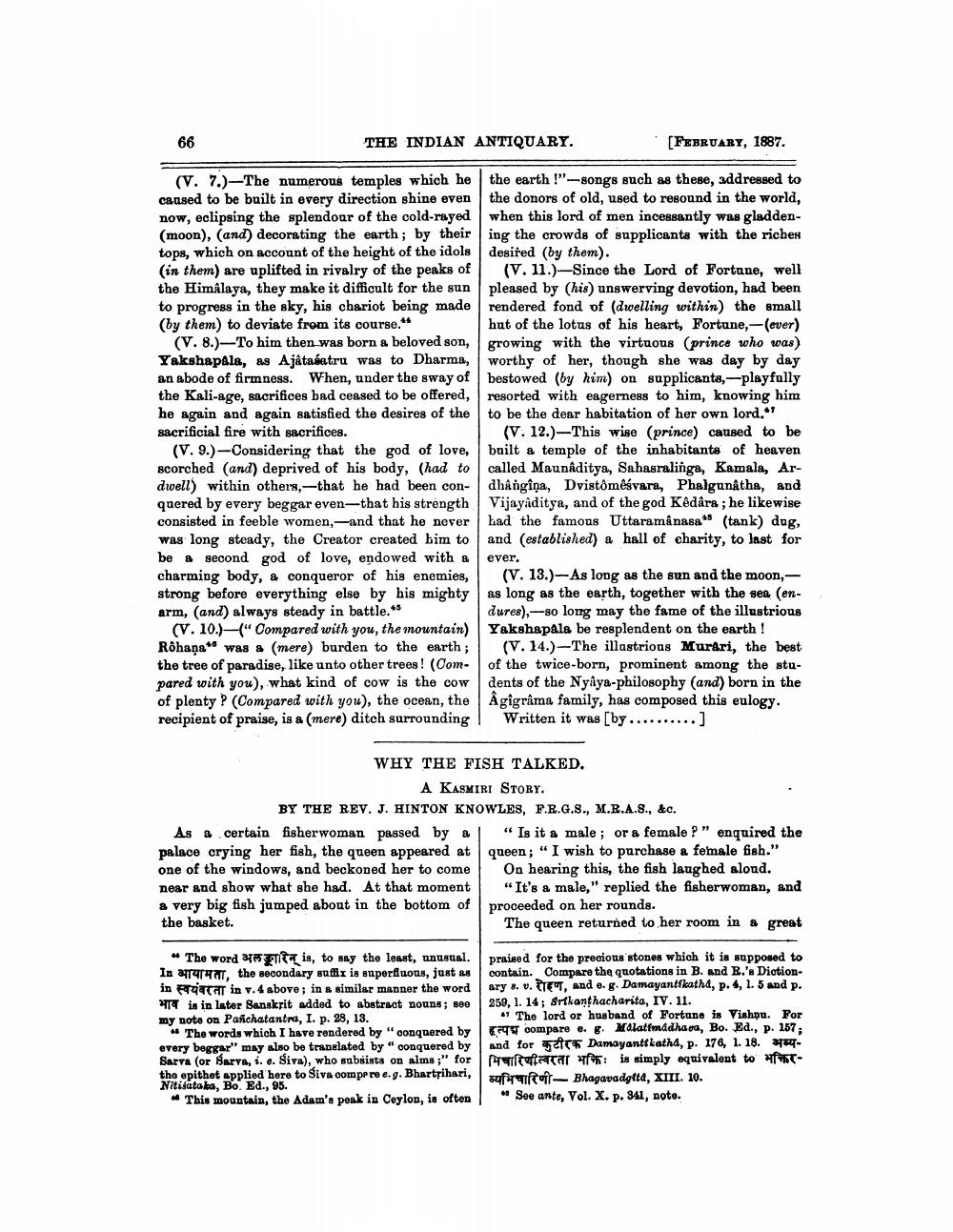________________
66
THE INDIAN ANTIQUARY.
FEBRUARY, 1887.
(V. 7.)-The numerous temples which he the earth !"-songs such as these, addressed to caused to be built in every direction shine even the donors of old, used to resound in the world, now, eclipsing the splendour of the cold-rayed when this lord of men incessantly was gladden(moon), (and) decorating the earth; by their ing the crowds of supplicants with the riches tops, which on account of the height of the idols desired (by them). (in them) are uplifted in rivalry of the peaks of (V. 11.)-Since the Lord of Fortune, well the Himalaya, they make it difficult for the sun pleased by (his) unswerving devotion, had been to progress in the sky, his chariot being made rendered fond of (dwelling within the small (by them) to deviate from its course.**
hut of the lotus of his heart, Fortune,-(ever) (V. 8.)-To him then was born a beloved son, growing with the virtuous (prince who was) Yakshapala, as Ajátasatru was to Dharma, worthy of her, though she was day by day an abode of firmness. When, under the sway of bestowed (by him) on supplicants,-playfully the Kali-age, sacrifices bad ceased to be offered, resorted with eagerness to him, knowing him he again and again satisfied the desires of the to be the dear habitation of her own lord." sacrificial fire with sacrifices.
(V. 12.)-This wise (prince) caused to be (V. 9.)- Considering that the god of love, built a temple of the inhabitants of heaven scorched (and) deprived of his body, (had to called Maunaditya, Sahasralinga, Kamala, Ardwell) within others, that he had been con- | dhangîņa, Dvistômesvara, Phalgunátha, and quered by every beggar even--that his strength Vijayaditya, and of the god Kedara ; he likewise consisted in feeble women, and that he never had the famous Uttaramanasa* (tank) dag, was long steady, the Creator created bim to and established) a hall of charity, to last for be a second god of love, endowed with a ever. charming body, a conqueror of his enemies, (V. 13.)- As long as the sun and the moon, strong before everything else by his mighty as long as the earth, together with the sea (enarm, (and) always steady in battle."
dures),--so long may the fame of the illustrious (V. 10.) " Compared with you, the mountain) Yakshapala be resplendent on the earth! Rôhaņa*' was a (mere) burden to the earth; (V. 14.)-The illastrious Murari, the best the tree of paradise, like unto other trees! (Com of the twice-born, prominent among the stupared with you), what kind of cow is the cow dents of the Nyâya-philosophy (and) born in the of plenty ? (Compared with you), the ocean, the Agigrama family, has composed this eulogy. recipient of praise, is a (mere) ditch surrounding Written it was [by ..........]
WHY THE FISH TALKED.
A KASMIRI STORY. BY THE REV. J. HINTON KNOWLES, F.R.G.S., M.R.A.S., &c. As a certain fisherwoman passed by a "Is it a male; or a female P" enquired the palace crying her fish, the queen appeared at queen; "I wish to purchase a female fish." one of the windows, and beckoned her to come On hearing this, the fish laughed aloud. near and show what she had. At that moment "It's a male," replied the fisherwoman, and a very big fish jumped about in the bottom of proceeded on her rounds. the basket.
The queen returned to her room in a great
· The word Tit is, to say the least, unusual. In TATHI, the secondary suffir is superfluous, just as in Frage in v. 4 above; in a similar manner the word PTT is in later Sanskrit added to abstract nouns ; 800 my note on Panchatantra, I. p. 28, 13.
* The words which I have rendered by "conquered by every boggar" may also be translated by "conquered by Sarva (or Sarva, 1. e. Siva), who subsists on alms;" for the epithet applied here to Siva compree.g. Bhartihari, Nitidataka, Bo. Ed., 95.
This mountain, the Adam's peak in Ceylon, is often
praised for the precious stones which it is supposed to contain. Compare the quotations in B. and R.'s Dictionary 8. v. TTET, and e. g. Damayantikatha, p.4, 1. 5 and p. 259, 1. 14; Srikanthacharita, IV. 11.
* The lord or husband of Fortune is Vishnu. For
9 compare e. & Malatimadhava, Bo. Ed., p. 157; and for th Damayantikatha, p. 176, 1. 18. 274
w atarrar uf: is simply equivalent to whsufrufor-- Bhagavadgita, XIII. 10.
" See ante, Vol. X. p. 341, note.




